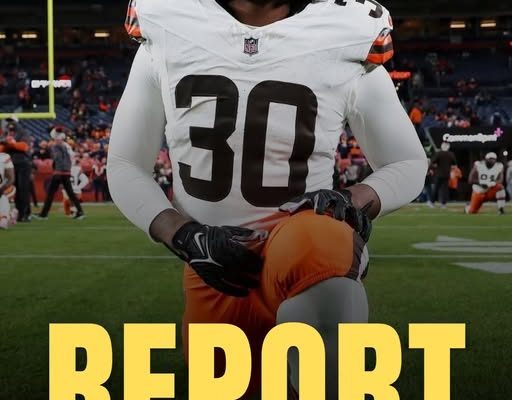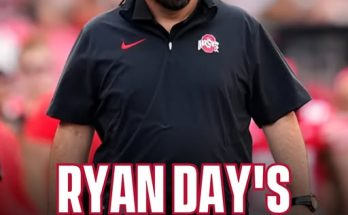Cleveland Browns linebacker Devin Bush Jr. has recently found himself at the center of a troubling legal situation that has shocked fans, the NFL community, and the wider public alike. The charges against Bush stem from an alleged violent altercation at his home in suburban Pittsburgh, which has raised serious concerns about domestic violence and accountability among professional athletes. This incident not only threatens to impact Bush’s career but also contributes to the ongoing national conversation about the responsibility athletes have as public figures, and the need for the sports industry to address issues of personal conduct with greater urgency.
According to police reports, Devin Bush Jr. was charged with misdemeanor simple assault and harassment following an incident involving his girlfriend. The authorities say that Bush allegedly chased his girlfriend, pinned her against a massage table, and smashed her phone to prevent her from calling for help. The victim reportedly suffered visible injuries to her wrist and foot. While Bush has admitted to destroying the phone, he denies the allegations of physical assault. The conflicting accounts in this case highlight the complexity often involved in domestic violence situations and underscore the importance of a thorough and fair investigation.
Devin Bush Jr. is no stranger to the spotlight. A former first-round draft pick for the Cleveland Browns, Bush has earned a reputation on the field as a hard-hitting, dynamic linebacker. His skills and athleticism have made him a key part of the Browns’ defensive lineup, and fans have admired his intensity and commitment to the game. However, off the field, this recent incident puts a heavy cloud over his professional and personal life. The repercussions of such legal issues extend far beyond just the individual involved; they affect teams, fans, and the league’s image as a whole.
Domestic violence remains a pervasive problem in society, and professional athletes are not immune to these issues. High-profile cases involving athletes often garner intense media scrutiny, but they also offer opportunities for sports organizations to set examples of accountability and support for victims. The NFL, in particular, has faced criticism in the past for its handling of domestic violence allegations. Over the years, the league has implemented policies aimed at addressing and deterring such behavior, including mandatory education programs and harsher penalties for offenders. Yet, incidents like the one involving Devin Bush Jr. reveal that challenges remain in effectively preventing and responding to domestic violence within professional sports.
One of the major challenges in domestic violence cases is the difficulty in establishing facts when there are conflicting narratives. In Bush’s case, while the police report details the victim’s account of being chased, pinned, and injured, Bush himself denies physically assaulting his girlfriend. He admits only to destroying the phone, a fact that in itself is serious as it was allegedly done to prevent the victim from seeking help. The destruction of evidence or communication devices is often considered a form of harassment and control in abusive relationships. This admission, coupled with the victim’s visible injuries, has led to the misdemeanor charges being filed.
Legal proceedings in such cases can be complex and emotionally charged. It is important for the judicial system to carefully weigh evidence from both sides to ensure that justice is served. For Devin Bush Jr., the process may involve court appearances, potential restraining orders, and other legal consequences depending on how the case unfolds. Additionally, the Browns organization and the NFL will likely conduct their own internal investigations and determine if further disciplinary action is necessary under league policies.
The impact on Bush’s career could be significant. The NFL has a personal conduct policy that allows the league to impose penalties independently of the legal system, including suspensions and fines. Players found guilty of domestic violence or other forms of abuse can face severe consequences, ranging from game suspensions to indefinite bans. Even allegations alone can damage a player’s reputation and marketability, affecting endorsements and fan support. For a linebacker like Bush, whose role depends heavily on public perception and team cohesion, the fallout from these charges could alter his professional trajectory.
Moreover, this case adds to the broader dialogue on how professional sports handle issues related to domestic violence and athlete behavior off the field. Many argue that sports leagues have a responsibility not just to punish offenders but to foster environments that promote respect, education, and prevention. This includes implementing comprehensive training for players, staff, and coaches on recognizing and addressing domestic violence, as well as providing support resources for victims. Organizations like the NFL have made strides in this direction, but critics insist that more must be done to prevent such incidents and to respond swiftly and fairly when they occur.
The conversation around athletes and domestic violence also intersects with societal issues of masculinity, power dynamics, and cultural expectations. Professional sports often emphasize toughness, aggression, and dominance, traits that can sometimes blur the lines between competitive intensity and harmful behavior. Educating athletes on healthy relationships, emotional intelligence, and conflict resolution is crucial in addressing root causes and changing harmful patterns. Public figures like Devin Bush Jr. hold influence over many fans and young athletes, making their personal conduct and accountability even more impactful.
Beyond the individual and league consequences, the victim’s well-being must remain at the forefront. Domestic violence victims often face tremendous physical and emotional trauma, and it is vital that they receive appropriate care and support. The criminal justice system, social services, and community organizations play key roles in providing protection and assistance. Raising awareness and encouraging victims to speak out without fear of retaliation or stigma is essential in combating domestic violence on all levels.
As the legal case involving Devin Bush Jr. progresses, it will be important for the Cleveland Browns, the NFL, and the broader sports community to handle the situation with transparency, fairness, and sensitivity. The outcomes here will likely influence how similar cases are addressed in the future and could contribute to ongoing reforms in athlete conduct policies. Fans and stakeholders will be watching closely to see how the league balances due process with the imperative to uphold ethical standards and support victims.
This incident serves as a reminder that the lives of professional athletes are not separate from societal issues but are deeply intertwined with them. While the athletic achievements of players like Devin Bush Jr. inspire many, their actions off the field can either reinforce positive values or highlight critical areas for growth and accountability. The hope is that through education, awareness, and consistent enforcement of conduct standards, the sports world can become a safer and more respectful environment for everyone.
In conclusion, the charges against Cleveland Browns linebacker Devin Bush Jr. mark a serious and concerning moment in the player’s career and in the ongoing struggle against domestic violence in professional sports. As investigations continue and legal proceedings unfold, the implications will be felt by the individual, the team, the league, and the community at large. Addressing such issues requires a multifaceted approach that prioritizes justice, supports victims, and promotes a culture of respect and responsibility. Only through sustained effort and commitment can the sports industry hope to prevent future incidents and foster a safer environment for all involved.



